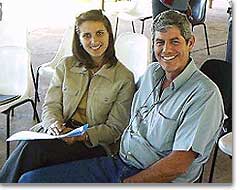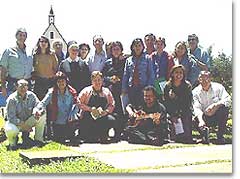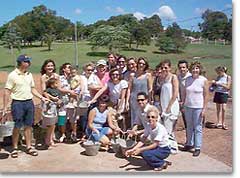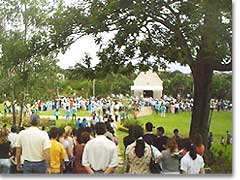 |
|
Eduardo y Silvia Nery Huerta Eduardo and Silvia Nery Huerta Eduardo und Silvia Nery Huerta |
|
 |
|
Eduardo y Silvia Nery Huerta en octubre de 2003, en una jornada con la Hna Edna Eduardo and Silvia Nery Huerta in October 2003, during a retreat with Sr. Edna Eduardo und Silvia Nery Huerta im Oktober 2003 bei einer Tagung mit Schw. Edna |
|
 |
|
Con su grupo de familias With their family group Mit ihrer Familiengruppe |
|
 |
|
Un jardín de María, un jardín del Padre - modelo de lo que Paraguay puede ser. A garden of Mary, a garden of the Father - model of what Paraguay can be Ein Garten Mariens, ein Garten des Vaters - Modell für ein neues Paraguay |
|
 |
|
Del Santuario a la casa... y a la Camara de Diputados: Invitación a la bendición del Santuario Hogar From the Shrine to the House...and the Chamber: Invitation to the Blessing of the Home Shrine Vom Heiligtum ins Haus… und in die Politik: Einladung zur Einweihung des Hausheiligtums Fotos: Cabral © 2004 |
PARAGUAY, Javier Cabral. " I am convinced that there could be another way to do politics," says Eduardo Nery Huerta from Ciudad de Este, national representative for the department of Alto Parana in the Chamber of Representatives in Paraguay. "If I wanted to choose a politician as an example I would choose Father Kentenich, of course." Since 1989 Eduardo and Sylvia Nery Huerta have been part of the family branch in Ciudad del Este. Their original group was called "New Times" (Tiempo Nuevo). He is in politics so that the new age may belong to God.
Eduardo and Sylvia Nery Huerta are now part of the group of the Members Circle N. 1 of the Apostolic League. (In Paraguay the Schoenstatt members who make their Covenant as members in the Apostolic League meet in groups to continue with their instruction and to nurture the community, which is very important to Latin Americans. E.N.)
They have been in charge of groups, diocesan directors of the family branch and diocesan coordinators, positions that they left in December 2002 to allow Eduardo to work full time in the Election Campaign. He had never participated in politics before.
And, something just as important: at the time of the construction of the Shrine in Ciudad del Este, he was the first correspondent of schoenstatt.de from there and in Paraguay and among the first correspondents ever.
The Chamber of Representatives is one of the two chambers that form the Congress of the nation of Paraguay. The Chamber of Representatives is formed by 80 representatives from the different Departments that divide the country. Its members are elected for a five- year term and they may be re-elected for other periods. We asked Eduardo Nery Huerta:
What motivated you to chose the political work?
For years I have been praying daily asking for a light to be able to identify a mission through which I can serve better. I always found useful the "open door law" and had very precise "creative results". I have not enough space to go into detail but these open doors guided me in a well defined path to something I had never before considered as a personal activity and one which I almost detested, namely politics.
Do you understand this political commitment as your personal vocation as a member of Schoenstatt?
At this time in my life, receiving so many blessings, it is hard for me to separate the personal from the Schoenstatt commitment. I did not enter the political world by chance or opportunity but as the result of a long process of reflection, discernment in prayer with the guidance of Divine Providence to arrive where I am today. I feel, therefore, convinced and committed to the mission and with the help of Divine Providence I happily follow the difficult path that is full of threats but always, thank God, clearly guided and guarded with love.
Do you have any "politician model" or a person in politics as your model?
No, I have no political models. I don’t like traditional politics. Now that I find myself involved I firmly believe that another way to make politics is possible. I still don’t know what and how but I know that in due time our Father will show it to me. If I had to choose a politician as an example, I would select Father Kentenich. He was a great politician, not in government politics, but he was a great leader concerned with mankind and its decadence. When facing the signs of self destruction, instead of feeling overwhelmed and impotent he fought with strong determination, courage and the audacity to form a new man in a new community.
Which are the key issues – for you – of a new politics for a new world?
I dream of a more humane politics, closer to people, to the individual. Today the politicians are involved in macro-politics. The tendency is to focus on the big, the macro-economy, globalization, access to great markets and the world power blocks. Within the country we dedicate a lot of time to the party, the movement and the electioneering campaign, so we relegate the problem of the individual, of the person and his/her dignity, to second place.
The international agreements, the search for unity between countries are issues of great importance for any nation, but at the same time we must take care and protect diversity and our own identity. If God created such diversity: plants, animals, mankind and its character and customs, why do we need to change that marvelous complex plurality? We watch with horror the way we live in a world more and more globalized, that is loosing its cultural, political and human diversity.
I dream and work towards the goal of being part of a political class that knows how to articulate harmony with the rest of the world but with particular sensitivity to the needs of the individual. A political class proud of its national identity. A political class which, by building its own dignity, can be totally immersed in protecting the dignity of each of its countrymen.
What are the most important challenges of your task?
To fight against the "it’s the way it is done", against the conviction that politics is like that because it cannot be otherwise. Fight against disappointment when we see that those who think differently are a minority and then at the polls we usually loose. Fight against the difficulties of exposing our families and our own person, sometimes in a painful manner. Fight to cause the minimum damage to family life (many of my activities are done 200 miles from my home)
Father Kentenich spoke about "mortal jumps" for those extremely delicate decisions. Today, in the XXI century we can say "Bungee Jump", which is classified as the extreme sport, the one some people practice by jumping from very high altitude with only the security of an elastic rope tied to the ankles. This is the comparison I make because I feel like that now: I feel as if I have jumped into nothing and my whole trust is in the rope tied to my ankles: that rope is God. In spite of danger, even faced with fear, I firmly believe the rope is there, it is secured.
Is there something in the Schoenstatt spirituality or in the life of Joseph Kentenich that may help you in your task today?
The Pre-Founding documents have always been of great inspiration for me. Under Mary’s protection I try to become a strong personality, free and apostolic. Whoever can do all this and above all communicate all this, will be a great politician.
I don’t feel worthy of taking Fr. Kentenich words, but I would like to be able to, some day, tell those I represent that I am determined to fulfil my duties to all of you and each of you as perfectly as possible. I now place myself completely at your disposal with all that I am, and have: my knowledge and ignorance, my ability and inability, but above all, my heart. (Pre-Founding Document )
The charisma and the development of the concept of " Practical Faith in Divine Providence" is a fantastic gift of Fr Kentenich. I try to practice it every day.
There are politicians of the "Focolare" Movement who commit themselves to work for unity; others like those of the Community Sant’Egidio, work for peace. What is the commitment of the politicians of Schoenstatt?
I don’t think I can speak about the Schoenstatt politicians, but personally I am concerned with one issue that worries me and is a cause for shame: Paraguay is considered as one of the three most corrupt countries of the world according to "Transparencia International". I don’t know if that is so, but it may be close. Nothing seems to be too bad in my country, and when an action is obviously bad, there are the personal excuses, family or sector motives that make it acceptable to the conscience.
We should put an accent on the construction of values and establish the right ethical and moral paradigms. This is a challenge not only for the politicians but also for the people. For the legislators the challenge is greater because we are the representatives of the people; we should set an example, the mirror in which they see themselves and from which they project their own values. With these values they may qualify us, they may demand from us and elect us as their next representatives.
In that context, the first legislative initiative of our "bench" (Patria Querida) last year, was the presentation of a project of "Code of Ethics for the Chamber of Representatives." This is one of the most discredited institutions in Paraguay and in this way we are trying to recover the respect and trust of the people. The project is not only a code of ethical principles but it also defines sanctions for the non-observance of the norms, the Constitution and the Laws. We don’t have the project in the plenary session yet but we hope that it will be discussed in the next session.
Do you believe you can make a difference with your dedication?
No doubt. I am convinced that is what God asked me to do and that if I give all I have, something will happen. Besides, I am not alone, I belong to an exceptional "bench", with very homogenous values. With such colleagues the task is easier, we support each other. It is also easy to identify several other good politicians in the other political sectors. It is worth mentioning that on my "bench" there are two other Schoenstatt members: Olga Lopez and Carlos Soler.
Paraguay is in bad shape, but it can be better. We have everything to enable us to be much better: natural resources, (over-exploited but still abundant), human resources, people with great faith, deeply close to Mary but perhaps disoriented today. We are few Paraguayans with a lot of fertile soil, with enough water to quench thirst, to irrigate the farms, for leisure, and to provide energy. We will achieve much if with our example and dedication we attract committed individuals to build a national community.
Translation: Carmen Barrule, Belgium/John and Jan Beebe, England